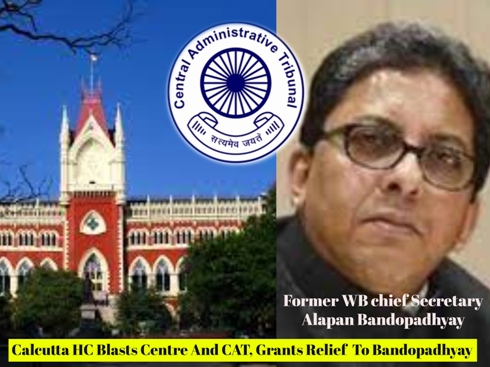

By Sunil Garodia
First publised on 2021-10-30 07:43:20
The Calcutta HC came down heavily on the Union government and the Central Administrative Tribunal's (CAT) Delhi branch in former West Bengal chief secretary Alapan Bandopadhyay's case. It blasted the Central government for the manner in which it proceeded with the case saying that it smacked of mala fides. It took the CAT to task for paying "obeisance to the diktat" of the Central government.
To readers who are not aware of the case, as chief secretary of West Bengal, Bandopadhyay was summoned to be present when Prime Minister Modi visited the state to study the impact of Cyclone Yaas in May this year. But he chose not to do so and instead went with chief minister Mamata Banerjee on a tour of the devastated areas after putting in an appearance before the Prime Minister for just few minutes. Piqued by this, the government initiated administrative action against him. As per rules, the Central action was correct as Bandopadhyay has to first report to the PM. But the urgency and the speed with which such action was initiated and the manner in which it was sought to be disposed raised eyebrows. When the case was transferred from the Kolkata branch of CAT to its Delhi branch, Bandopadhyay rightly took umbrage and approached the Calcutta HC against the transfer order.
The High Court now considered three things - whether it was competent to hear an order passed CAT's Delhi branch; whether CAT's Delhi branch was competent to hear the matter as the case was filed in Kolkata; and finally, whether it was correct to transfer the case from Kolkata to Delhi. The court heard the matter as it said that since the incident happened in Kolkata and the case was originally filed in CAT's Kolkata branch, there was no issue about it having jurisdiction. As for the other two issues, the court said that the grounds for transferring the case to Delhi were flimsy and did not warrant such an action. It also said that in hearing a matter filed in Kolkata, the Delhi branch of CAT showed an unwanted willingness to bend to pressure from the Central government.
Finally, the court said that the entire process was unfair to Bandopadhyay as it did not give him time to respond to notices. It said that the way things unfolded, not only were his legal rights were hampered but his fundamental right of "equality before law" was also violated. The court ordered that the case should be transferred back to CAT's Kolkata branch and directed it to dispose it "expeditiously". The court also said that the entire episode "shocks the judicial conscience" and "poses a threat to the federal structure".
India is a democratic country governed by the rule of law. The government is expected to follow due process in all cases, even when it feels that an employee has not followed orders. The accused has to be given reasonable time to respond to notices which are issued as per law. In showing undue haste in prosecuting Bandopadhyay, the government did not follow due process and it looked as if it was bent on extracting revenge. The Calcutta HC is right in castigating such efforts and protecting the rights of the individual. If Bandopadhyay committed a mistake, he must be charged and punished as per service rules, but this has to be done by following due process and not as per the whims and fancies of those in power or by using strong-arm tactics.











